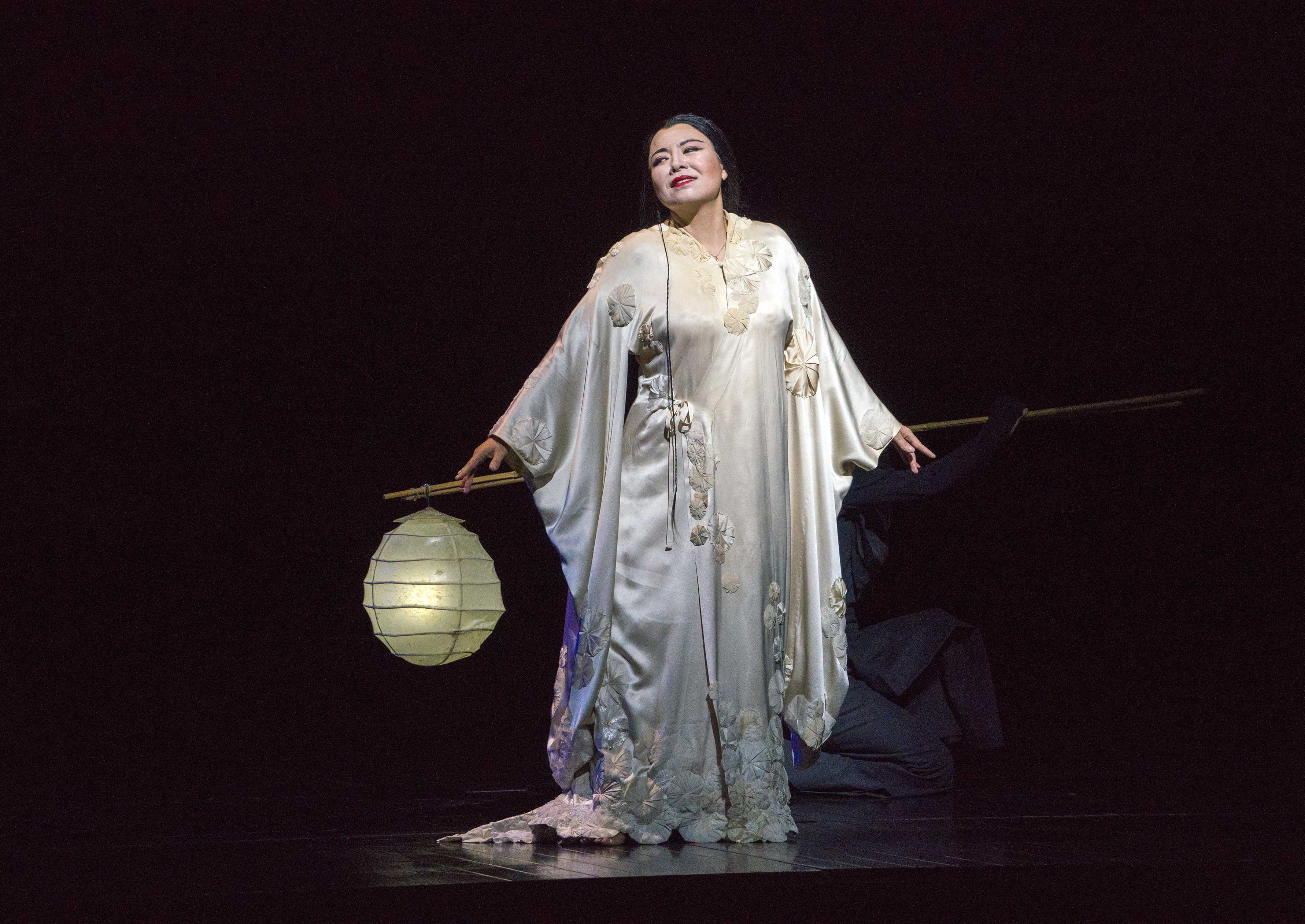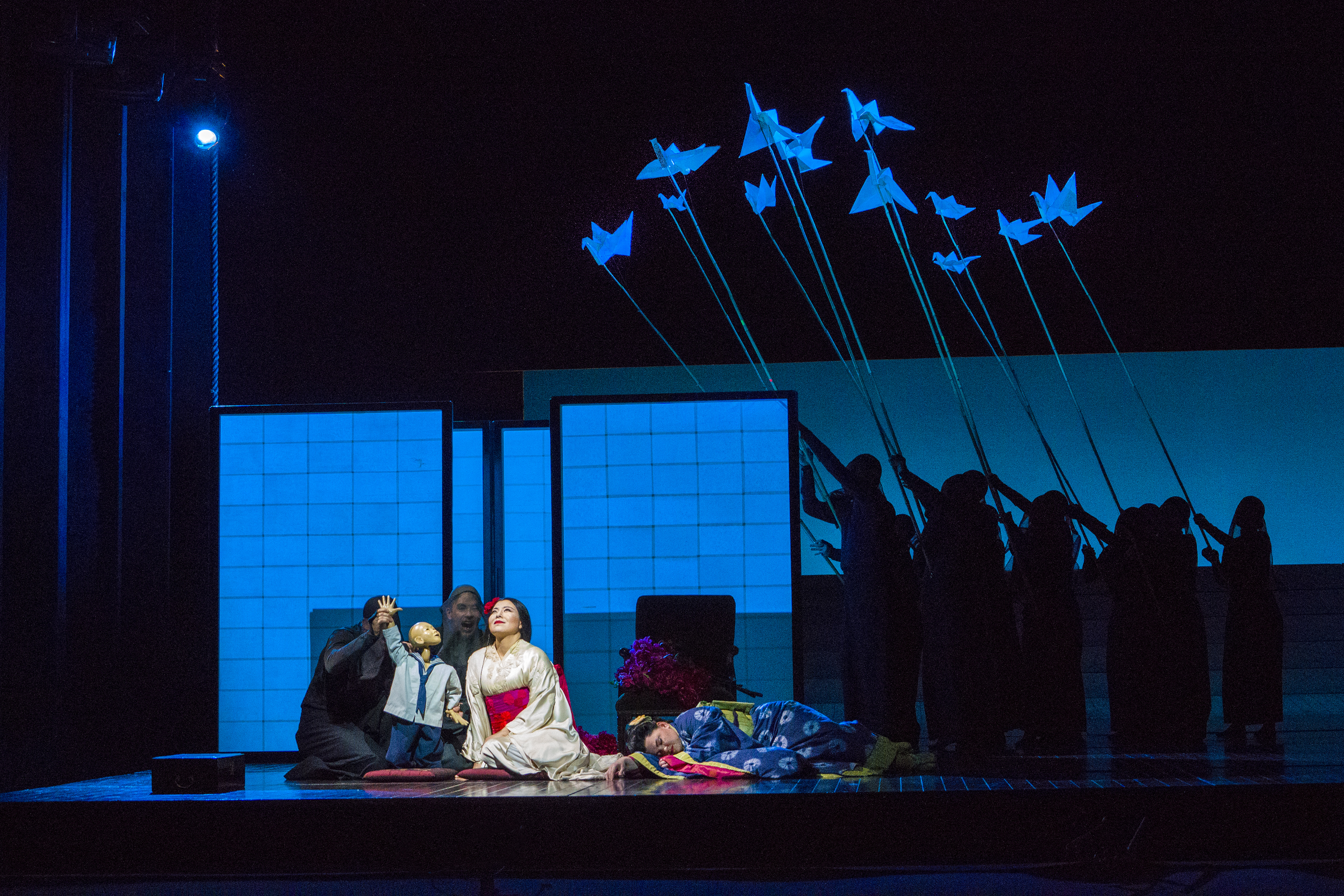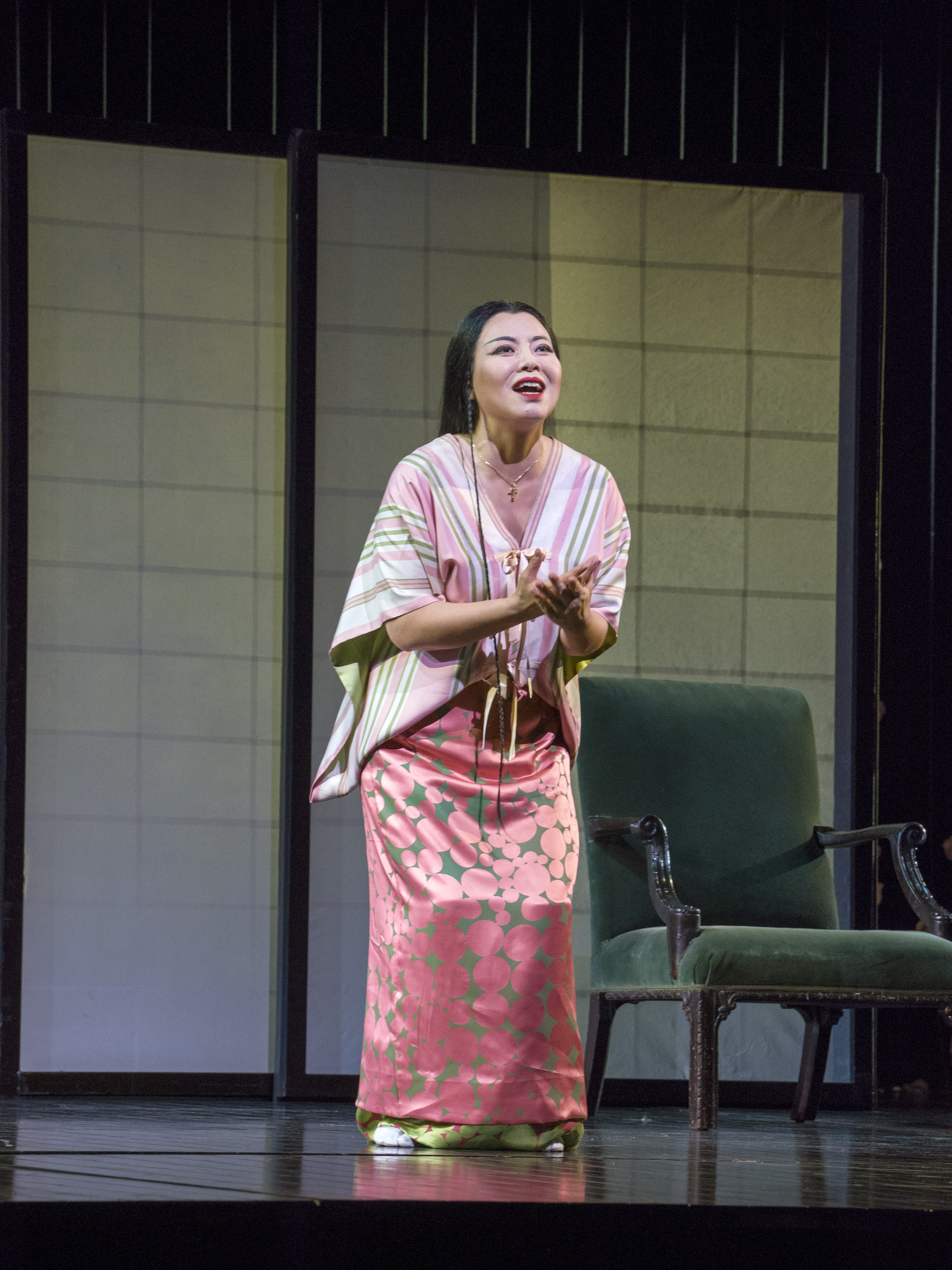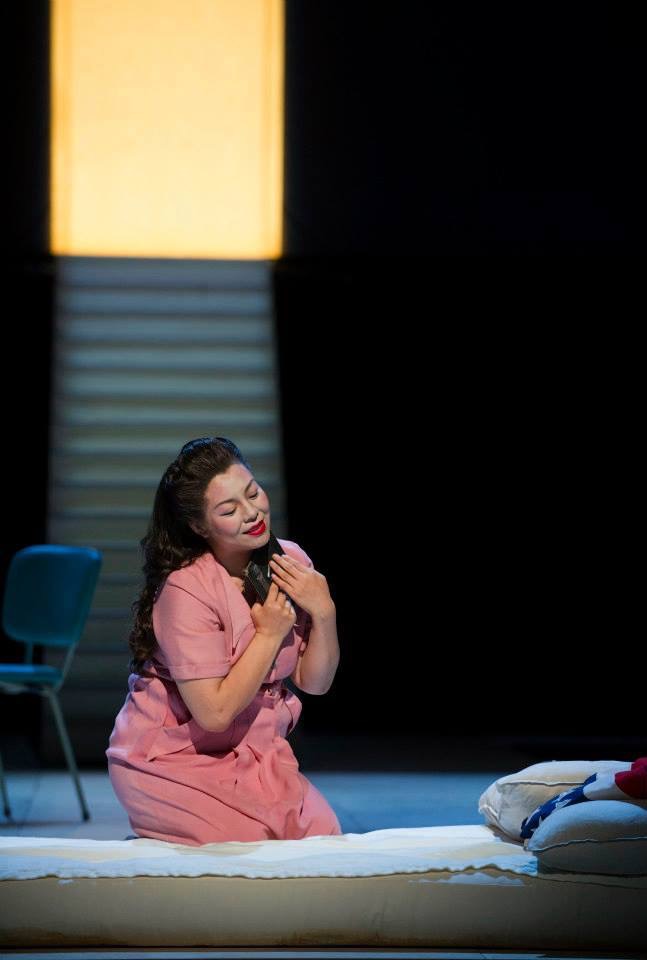
Photo © 2019 Richard Termine / Met Opera
Hui he has a voice one can’t help but notice, a big, juicy, Italianate sound, the sort of sound I grew up with, the sort of sound my Italian-opera-loving mother loved so much. If there’s a nostalgia in enjoying He’s voice so much, so be it; hers is a voice that very much puts the “grand” in grand opera.
He started out her studies in China at the Xi’an Conservatory of Music, and made her debut as Aida (yes, really) in a 1998 production marking the opening of Shanghai Grand Theater. In 2000 she won second place at the prestigious Operalia competition, and a year later, first prize at the Concorso Internazionale Voci Verdiane in Verdi’s hometown of Busseto. Since then, she’s become a mainstay on European stages and has appeared at a number of prestigious houses, including Wiener Staatsoper, Teatro alla Scala di Milano, Deutsche Oper Berlin, Opéra de Paris, Gran Teatre del Liceu, Semperoper Dresden, Bayerische Staatsoper, and Oper Zürich; last season she made her debut at Théâtre Royal de la Monnaie (Brussels) as the title role in a new production of La Gioconda. He made her Metropolitan Opera debut in 2010, as the title character in Aida, a signature role she has recorded twice on DVD, in 2011 with Maggio Musicale Fiorentino and conductor Zubin Mehta, and again in 2012, at the immense Arena di Verona under conductor Daniel Oren. What with 2013 marking the 200th year of Verdi’s birth, He returned to Aida (at La Scala Milan), and also took part in a performance of the composer’s Requiem in Verona, where she is based.
It’s probably fair to state that the soprano is something of a specialist when it comes to performing the Italian composer’s music; she’s appeared in productions of Un ballo in maschera, Il trovatore, La forza del destino, Ernani, and Stiffelio, as well as the famous Aida. She’s also known for her passionate approach to verismo roles, and has appeared in productions of Madama Butterfly, Manon Lescaut, and Tosca (the latter being a role that greatly aided in her breakthrough in Europe, starting with her performance at Teatro Regio di Parma in 2002). He ably demonstrates her immense vocal gifts (not wrongly described as “wine dark“) on her 2007 album of Verdi and Puccini arias (Oehms Classics), which is filled with a myriad of well-known gems from both composers, including heartfelt renditions of beloved arias from Aida, Butterfly, and Tosca, and imbuing each note with pungent, visceral drama. A personal favorite is her deeply expressive performance of “Liberamente or piangi” from Attila, lovingly phrased, with rich intonation and watchful dynamic control; it’s a showcase of beautiful vocal artistry. At her Lyric Opera debut in 2012 (in Aida), the Chicago Tribune noted He “possesses a healthy, flexible, warmly beautiful spinto voice backed by solid technique and fine musical intelligence. Her big voice opened up easily in the big climaxes […] and brought out the melting lyricism in Aida’s many tender phrases.”
“Melting lyricism” is a good way to describe her approach to the album’s two tracks from Turandot, performances which, over a decade ago now, offered a preview of a role she debuted earlier this year at the Teatro Comunale di Bologna. She explained her slowness in taking on the part of Turandot in an interview during rehearsals for the production, noting that, outside of her vocal technique not being ready until this year, she “didn’t want to play this character so early, especially because being Chinese, I would risk that companies would only want me for this role.” (He will be performing it again at the Shanghai Opera House this December.) Another role debut earlier this year was Mimi in La bohème at the Festival Puccini Torre del Lago. The new year brings yet another role debut, as the title character in early Verdi opera Alzira at the Opéra Royal de Wallonie, Liège.

Photo © 2019 Richard Termine / Met Opera
He is currently performing the role of Cio-Cio San in Madama Butterfly at the Met through the end of November. It’s a role she’s frequently performed in Europe (Teatro Massimo di Palermo, Den Norske Opera Oslo, Deutsche Oper Berlin, Teatro Real de Madrid, and Gran Teatre del Liceu, to name a few), at Los Angeles Opera, and in New York too; her appearance in the current Anthony Minghella production marks her third time singing the role with the house. He and I recently had the chance to chat on a quiet Sunday afternoon, even as the sounds of ever-busy Manhattan buzzed in the background.
How old when you first heard opera?
When I was 18 years old I heard La bohème for the first time. the first time I listened I didn’t understand Italian or anything, but I fell in love with the voices and the music. I decided to be a singer very late — I like singing very much but I didn’t have a musical family. The first opera I saw live was Turandot, in 1996, in Beijing. I didn’t understand it very well —or really understand what opera would come to mean for me — but really, seeing it was this amazing world. I never thought I’d be a professional opera singer at that time, but seeing Turandot… I still remember the beautiful staging.
At that time, China would only present opera a few times a year, not like now! Now it’s a completely different thing; in a very short time China grew to have a lot of theatre. But at that time, China only had classical opera, I mean, Western opera, about once or twice a year. You could see it in Beijing or Shanghai — I’m from Xi’An, the ancient capital of China. It’s a very beautiful city, and very old. I got my start singing the music of Verdi very young.
How has your understanding of Verdi’s music changed? You’ve been singing it for a long time now.
Starting out in China I had a very good feeling with my voice for Aida, that my voice was very suited to it. Of course the first time I sang it was different than it is now; my voice, my body, everything changed. My experience changed, especially when I went to Italy — now I speak very good Italian! — but it’s very different, singing it now from twenty years ago. Everything became more mature. It’s a very natural and logical progression.
Do you notice differences in audiences? That the ones in the U.S. are different to the ones in Austria and Germany and England and China?
For me audience difference is not a problem, because I think what i need to do is, just do my best for every stage, in every city. I should show what is my best, give good quality, a maximum possibility for every performance. I think the music, the language, is a very special language, it’s connects with some very special part of life. The language of music through the voice can connect people, even those who have very far-apart cultures. In twenty-one years of career, I’ve seen many different cities and countries, in the West and the East. My main stages are in Europe and America. I think the most important thing is when I am onstage, I must show the best of what I feel that day. Yes, every audience is a different feeling, but if I do my best, and if I’m enjoying the show, then the audience will enjoy the show also.

Photo © 2019 Richard Termine / Met Opera
It’s been observed that Italy is very concerned with voice, and that in England and Europe there’s more focus on the theatrical aspect. What have you found?
I think this is a special thing, because Italy, yes — if you don’t have a voice, even if you’re a great actor, it won’t work — but also in Germany and England and some other places, there’s more concentration on drama. But I think as an opera singer, there are two important things: one is music, and one is acting. The audience can hear you and they can see you. You can’t say, “I’m very good vocal person and I’m a very bad actor — but I can still give a maximum performance” — no. It is always together.
You have to be a good actor, and have a beautiful voice, and have very good musicians. It’s many things together. I sing a lot of Puccini, and Puccini roles demand good acting — of course the voice is important, because if you don’t have the voice you can’t finish the opera. If you don’t have the technical basis, you can’t finish the opera. Also I’m a Verdi soprano, and when I sing Verdi, the most important thing is having good technique to sing every note musically — but acting is important too. If both things work, then you get success; if it’s only one thing, there’s no success.
Has that idea evolved in relation to the growth of Live in HD broadcasts?
I think it’s important as an actor to be aware of the theatrical aspect, but the singing is still very important. Singing well needs a lot of things: your vocal technique, your intonation, your musicality, your ability and balance, everything. This is the way we work and study every day, to be a good singer. I think for HD it’s important to be a good actor, but if the audience doesn’t hear a good sound from the voice, if there’s a problem with intonation or whatever musical problem, then they can’t accept it, even in the cinema.
The drama is very much written into the music — with Tosca and Butterfly, for instance, the drama is so palpably within the notes.
That’s true!
Often it takes the right conductor to bring it out in just the right way.
The conductor is really very important for the opera because the conductor, if they can understand singers and their sense of approach, and learn about the drama and the music during the drama, how to bridge it between singer and orchestra — yes, that’s helpful! I’ve met many great conductors, like Pier Giorgio Morandi — he’s a great conductor and he is very understanding of singers. Not many always understand the singer’s challenges. Sometimes everything has a different musical feeling or make different demands on the breath, so the conductor should be very understanding and comprehend those demands, and that leads to chemistry, being able to work together. That’s very important, because if the conductor can sing with the singer inside, and has the feeling of the music the same way, then it will be a great overall result and you will feel the chemistry in the performance. When we are together, the audience can feel that. When the conductor is not with the singer…
You feel that also!
… yes, there are problems! I have to say, there are a lot of conductors who don’t understand singers. I think really good opera conductors help singers — they should first, be a great musician, secondly, have the sensibility of the singer, and third, a person who has a big enough heart to understand and deal with a lot of different situations with everybody — good at forming and cultivating relationships.
You will be doing a role debut of Alzira next year. What’s that like to prepare? It’s expanding your repertoire.
I’m very excited to do Alzira, and now I’ve been preparing at the Met with a pianist while doing Butterfly. I feel like it’s a new world. Alzira is like an exam of technique. Earlier Verdi music is really very difficult, it’s a bel canto type thing, there’s a lot of coloratura — it’s not like singing Puccini or verismo, it’s a really technical situation — so I’m very glad my studies are going well. I’ve never sung this kind of music, or anything in a bel canto style; in italy, I immediately started with Aida, Butterfly, Tosca, Trovatore, and a little bit of later Verdi repertoire, but now I can do earlier Verdi. I’ve done Attila and Stiffelio but Alzira is really a very good opera for me right now, to help me for technique. I remember my coach told me, “Singing Verdi is like a medicine for singers, because Verdi extends the technique.” So if you’re singing Verdi well you can improve your technical situation. Butterfly is a little bit heavy, but it’s also a long role; it has a lot of various demands on the voice. I don’t want it to be low, so this is why during Butterfly I’m learning Alzira —it helps my Butterfly, it helps keep my voice in a high position, which is good.

Photo ©️Erik Berg/Den Norske Opera
Does this mean you’ll be doing more bel canto? I’m curious what other roles might be in your future.
I haven’t done French repertoire, but I think my voice is more for Italian repertoire. I hope to debut Don Carlo, Elisabetta, and I hope I can, in the future, sing Norma, Frau Angelica, a lot of roles that would fit me. I already did Manon Lescaut — I love it very much, it’s one of my favourites — and I did Strauss’s Ariadne auf Naxos, but I hope one day to sing Wagner. I think my voice is good for Tannhauser, Die Fliegende Hollander, and Tristan und Isolde. I hope I can enlarge my repertoire a little bit to sing different roles. I love to learn new roles, and I love learning new opera.
It makes you a better artist, to keep learning.
Of course — I like to work on different things at the same time. It’s why during this period I’m doing Butterfly but I’m learning Alzira, and I’m preparing a concert too. I’m enjoying it all!
